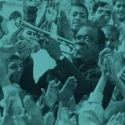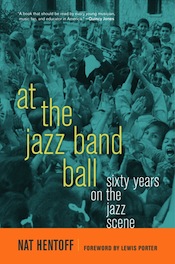
At the Jazz Band Ball: Sixty Years on the Jazz Scene
by Nat Hentoff

One could make a pretty decent case that Nat Hentoff is the most important journalist of the second half of the 20th century. Among those others who might rank that high, only Hentoff made his living primarily as a music writer, in addition to his work in politics. At the Jazz Band Ball is a short but information-dense and deeply compelling collection of Hentoff’s recent jazz writing – 64 chapters, spread out over 221 pages. This material covers just the last five years of his output, mostly his columns for Jazz Times, as well as essays originally published in the Village Voice and Wall Street Journal.
Besides his pioneering work covering the jazz scene at its all-time peak, Hentoff deserves credit as one of the first regular columnists for the Village Voice, which was the very first alternative newsweekly. He helped establish it as a brand name, and remained on the job until his suspicious firing in 2009 – an event that raised red flags all over the industry. He was nominally dropped due to budget cuts, but Hentoff himself speculated that it was due to his coverage of the Obama administration, which has continued many of the same policies that Hentoff rightly inveighed against during the Bush years.
If his theory was right, then it was perhaps the most explicit example in recent memory of a liberal publication eliminating a liberal writer for being insufficiently liberal. It’s surprising that conservative media didn’t jump all over the story, but then again, Nat Hentoff’s politics defy the stale cookie-cutter dualism and the ruthless reductionism that dominates our failed two-party system, so it would be very difficult to get any texture on such a story without contradicting the conventional wisdom.
Although I’ve never met him in person, Hentoff has remained an active presence in my life for nearly 20 years – first, as an indispensable guide to jazz music, the history of which was then unfolding backwards through my teenaged mind, and later as one of my first role models as I embarked upon my own career in journalism. Granted, I tended to take technical cues from people like Hunter S. Thompson, but the consistent vitality of Hentoff’s work-product, and his ability to balance somewhat divergent areas of expertise, made an early and distinct impression. A decade later, when Folio Weekly picked me to be the youngest (21) regular columnist in the industry at that time, my initial joy was centered on the idea of basically doing the same job he did.
Hentoff remains one of the few writers whose new work I read religiously, and a formidable standard for my own; my goal as an alt-weekly columnist, dealing mostly in politics and music, was to always be worthy saying to people that my column is almost as good as his. I was later lucky enough to speak with him on the phone several times, as he graciously allowed me to drop his name while trying to drum up interest in a book project I wanted to do about Max Roach, who had unfortunately already retired from public life and died not long after. He also helped me find contact information for my favorite jazz singer, Anita O’Day, who, like Roach, figures in this book and also died before I could get my tape recorder anywhere near them.
Little gestures like that mean a lot, and left me convinced that Hentoff is the real deal: someone whose desire to do the right thing trumps ego or financial considerations. He is, in short, the kind of reporter America needs 100 more of – or 1,000. I’d even long considered landing an internship at the Village Voice, specifically for the ineluctable pleasure of doing Hentoff’s grunt work, but that never happened – hell, I couldn’t even sell them jazz stories, or stories about political corruption in Florida – for reasons that are maybe easier explained in light of later events.
Even as a Hentoff fan, I was unaware that he has done so much work for the nominally-conservative WSJ, and these longer pieces are the most immediate reward of this collection. Another would be having the author’s perspective on a number of persons and events long since passed into history. Hentoff has lived long enough to have written the obituaries of many friends and colleagues of whom he also helped introduce to the jazz world, and the public at large. At least one jazz legend has died just in the period between the final draft and the publication of this book: the exceptionally tasteful pianist Hank Jones, the first and last of a clan that also included trumpeter Thad Jones and John Coltrane’s drummer of choice, Elvin Jones.
You could probably fill a whole book with Hentoff’s writing on just one artist: the great, irascible Charles Mingus (which included co-writing Mingus’ must-read Beneath the Underdog). This was a vital component of his career. Personally, I’d commission a book consisting entirely of the liner notes he wrote for countless jazz artists of the 1950s and ’60s – a narrow bailiwick of the literary arts in which Hentoff is an undisputed master – and make it required reading for journalism students.
Reading this stuff is kind of like sitting at the feet of wizened elders, as they hand down information essential to the tribe. As you might expect from any conversation with an old man, certain things get repeated; this is also a function of the columnist’s art, wherein stock phrases, concepts and metaphors are repeatedly employed differently, at different times in different ways. Really, it’s very much like jazz, especially given that writing on a deadline is basically an act of high-pressure improvisation.
The book is a wealth of factoids and anecdotes from in and around the jazz world, but it also introduces readers to some of the many wonderful people and organizations working to preserve the music, the musicians and the vibrant cultural history we all share. Such heroes include Wynton Marsalis and the whole crew at Jazz At Lincoln Center, who have gone to extraordinary lengths to firmly cement jazz as “America’s Classical Music” through creatively compelling concerts, pervasive pedagogy and seemingly non-stop public advocacy, including their “Higher Ground Hurricane Relief Fund”; the amazing Wendy Oxenhorn and Jarrett Lillian of the Jazz Foundation of America (JFA), which helps mitigate the expenses of aging, ailing musicians forgotten in the reissue boom; Agnes Varis of the Jazz in the Schools program (which paid hundreds of displaced NOLA musicians to perform for kids and seniors); the Englewood Hospital and Medical Center in New Jersey, endowed by a dying Dizzy Gillespie to provide free care to his colleagues through JFA’s Jazz Musicians Emergency Fund; and, last but not least, the late, lamented International Association of Jazz Educators, whose demise in 2009 remains something of a mystery. Add Hentoff’s name to that list, too.
(In a perfect world, the record industry, which has made billions selling jazz CDs over the past three decades, would get together to act unilaterally to set up some kind of royalty structure for the surviving sidemen on these classic recordings, kind of like how pro sports leagues try to look after the old-timers whose peaks preceded the explosion of player salaries and benefits in the 1980s. It seems easy for label executives to isolate the major sellers from their reissue catalogs and any still-living players from them, and then set aside some token portion of their massive profits from these sales for the benefit of these people, especially given that most of the biggest names in jazz history are dead. But that is not a prospect worth holding your breath over. After all, if the industry cared about its legends, such structures would have been erected 20 years ago.)
Nat Hentoff recently turned 85, so it’s entirely possible that At the Jazz Band Ball may turn out to be the final volume in a singularly diverse and dynamic journalism career. As a longtime fan and, frankly, an acolyte of his work, I certainly hope against hope that this protean force in our business keeps on going at least as long as some of the musicians he’s known (think Hank Jones, Jimmy Heath, Roy Haynes, Benny Carter or Lionel Hampton). But if things turn out otherwise, Hentoff has offered up a remarkable anthology that serves as both a bookend and an exclamation point to one of the all-time singular literary lives. I think the jazzmen call it a “grace note.”
University of California Press: http://www.ucpress.edu












